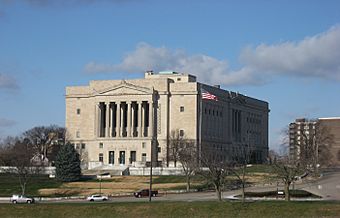Dayton Masonic Center facts for kids
Quick facts for kids |
|
|
Dayton Masonic Center
|
|
|
U.S. Historic district
Contributing property |
|
 |
|
| Location | 573 W. Riverview Avenue, Dayton, Ohio |
|---|---|
| Area | 8.5 acres (34,000 m2) |
| Built | 1925-1928 |
| Architectural style | Classical Revival |
| Part of | Steele's Hill-Grafton Hill Historic District (ID86001237) |
| Added to NRHP | June 5, 1986 |
The Dayton Masonic Center, once known as the Dayton Masonic Temple, is a really important and impressive building in Dayton, Ohio. It's a place where a group called the Masons meet and hold events.
Contents
A Special Building for the Masons
The Dayton Masonic Center was built by many different Masonic groups working together. They formed a special association just for this project.
How the Center Was Built
It took about two years and nine months to finish this huge building. Around 450 workers helped construct it. Many of these workers were Masons themselves. They worked very hard without expecting special rewards. They gave their time and skills to make sure the building was completed.
What the Building Looks Like
This building is very large! It is about 265 feet (81 m) long and 190 feet (58 m) wide. It stands about 80 feet (24 m) tall. The inside space is huge, about 5,000,000 cubic feet (140,000 m3).
Materials Used
The Dayton Masonic Center is built with strong materials. It uses steel, cement, and different kinds of stone. About 55,000 cubic feet (1,600 m3) of Bedford stone was used. This is a type of limestone from Indiana. They also used about 15,000 cubic feet (420 m3) of hard limestone and marble. This marble came from places like Vermont, Alabama, and Tennessee. Marble was used for the floors, walls, and stairways inside the building.
A Protected Historic Place
The Dayton Masonic Center is part of a special area called the Steele's Hill–Grafton Hill Historic District. A historic district is a neighborhood or area with many old buildings that are important to history.
Why It's Historic
This building is considered a "contributing property" to the historic district. This means it helps make the district special. The entire district was added to the National Register of Historic Places in 1986. This is a list of places in the United States that are important to history. The building is also part of a local historic district in Dayton. This helps protect its history and unique design.
 | William M. Jackson |
 | Juan E. Gilbert |
 | Neil deGrasse Tyson |



